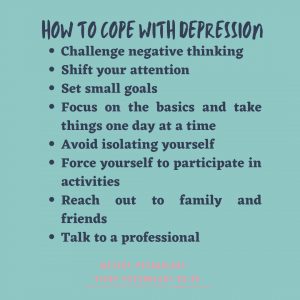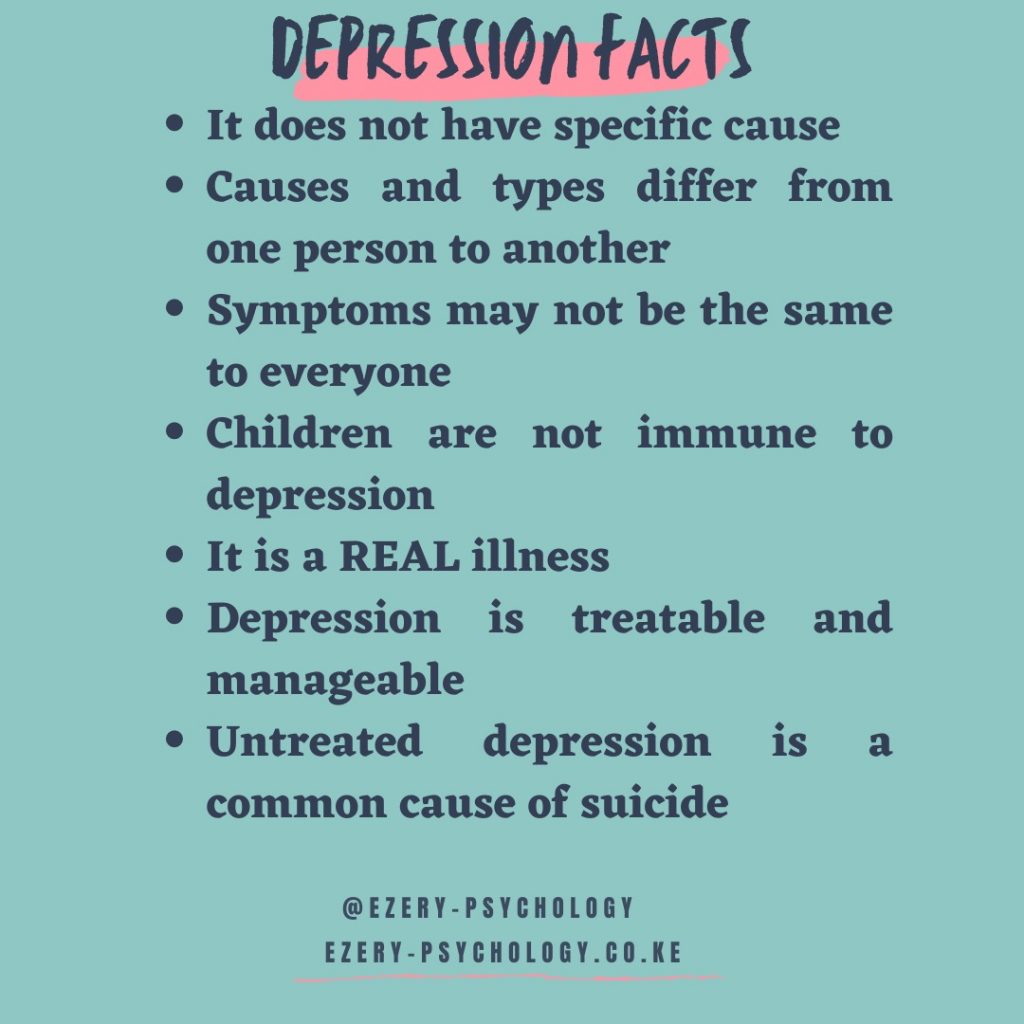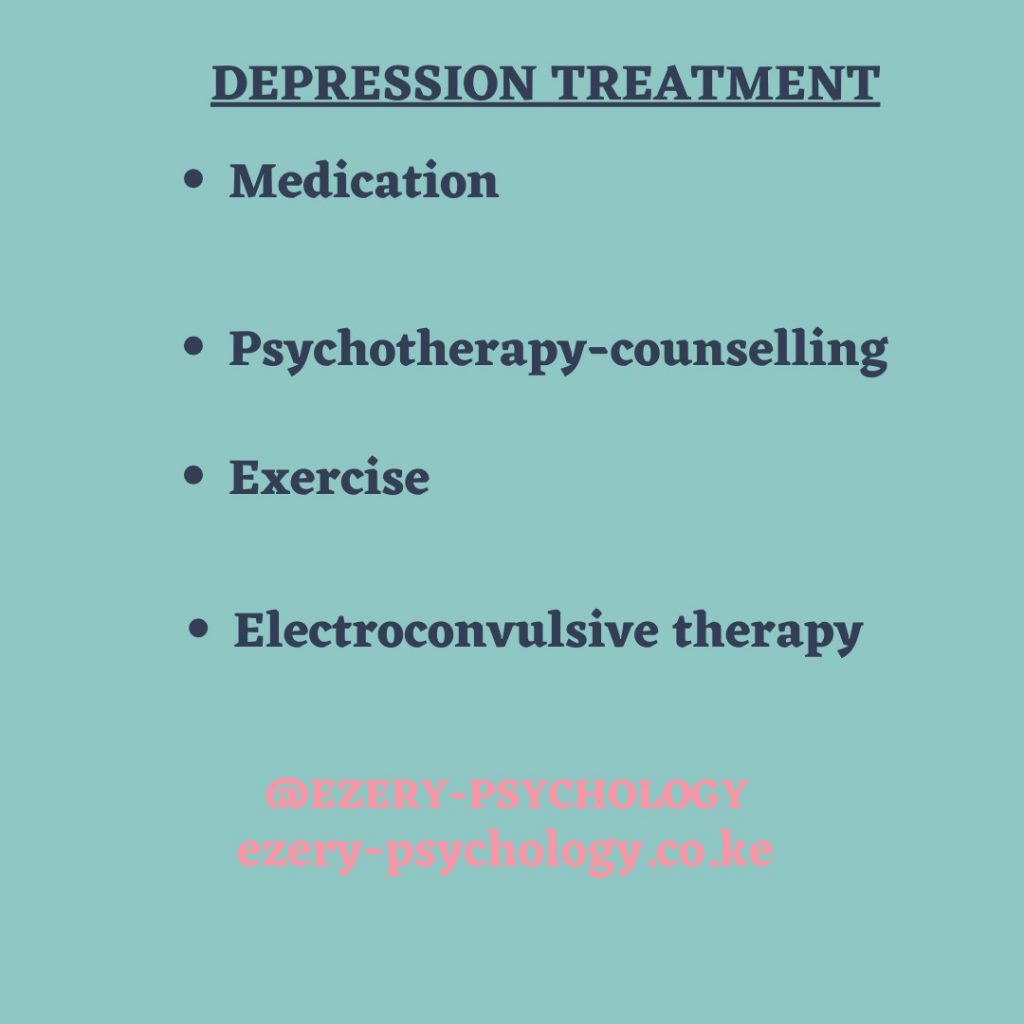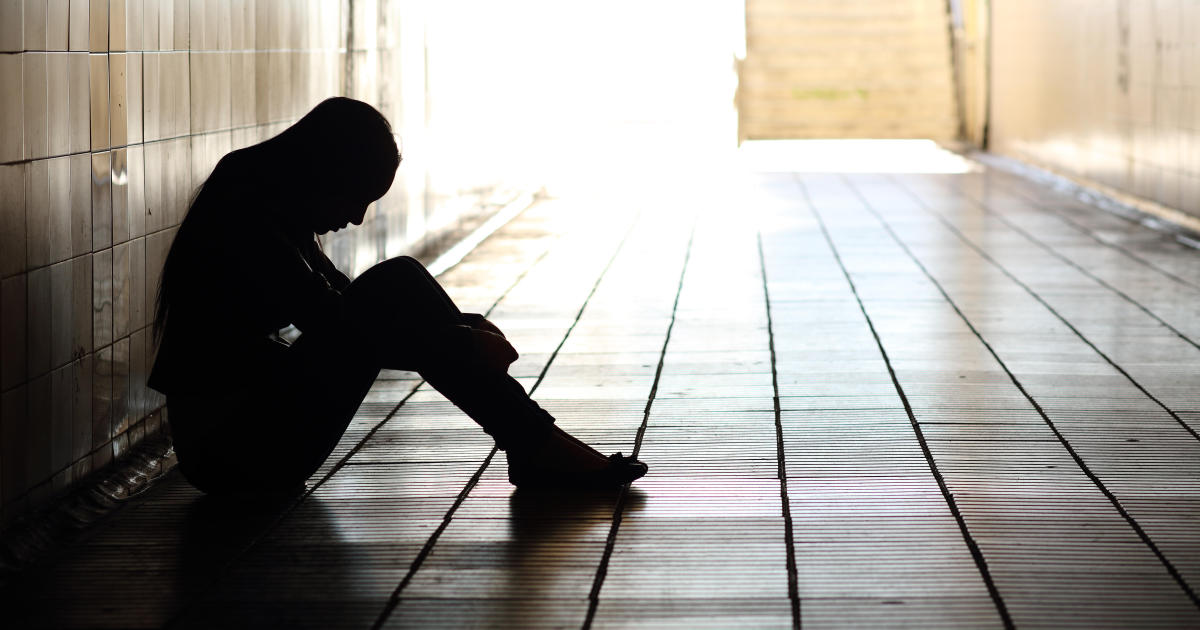Depression is classified as a mood disorder. It may be described as feelings of sadness, loss, or anger that interfere with a person’s everyday activities.
Causes of depression
- Genetics. You’re at a higher risk for developing depression if you have a family history of depression or another mood disorder.
- Early childhood trauma. Some events affect the way your body reacts to fear and stressful situations.
- Brain structure. There’s a greater risk for depression if the frontal lobe of your brain is less active. However, scientists don’t know if this happens before or after the onset of depressive symptoms.
- Medical conditions. Certain conditions may put you at higher risk, such as chronic illness, insomnia, chronic pain, or attention-deficit hyperactivity disorder (ADHD).
- Drug use. A history of drug or alcohol misuse can affect your risk.
Symptoms of depression
The symptoms of depression can be categorized into two forms;
Emotional symptoms
Some of the mental and emotional symptoms of depression include:
- Feeling hopeless
- Feeling indifferent
- Being irritable
- Feeling worthless, helpless, or guilty
- Feelings of anxiety or agitation
- Withdrawing from friends and family
- No longer interested in hobbies, activities, and spending time with others
- Difficulty with concentration and making decisions
- Thoughts of self-harm or suicide
- Loss of memory
Physical symptoms
Some of the physical symptoms of depression include:
- Fatigue or a noticeable loss of energy
- Headaches
- Digestive difficulties
- Body aches and pains with no clear reason for their presence
- Restlessness or an urge to move around constantly
- Trouble falling and staying asleep, waking extremely early or late
- Changes with weight due to overeating or not eating enough
- Self-harm
- Attempts at suicide
Forms of depression
The following are some of the primary forms of depression you must know about;
Major Depressive Disorder (MDD)
Symptoms are felt daily and are disruptive to day-to-day life, causing significant impairment.
Persistent Depressive Disorder
Symptoms are felt for prolonged periods, sometimes up to two years, although symptoms may not be as intense as with major depressive disorder.
Manic Depression
Negative symptoms alternate with feelings of euphoria or intense happiness.
Depressive Psychosis
Symptoms include hallucinations and a sense of losing touch with reality.
Perinatal Depression
Symptoms are experienced during pregnancy and for some time after the birth of a baby. Perinatal depression combines prenatal depression (depression occurring before birth) and postpartum depression (depression occurring in months after birth).
Postpartum Depression
Many new mothers will experience “baby blues” after childbirth. Baby blues include mood swings, trouble sleeping, and anxiety, and begin within two to three days after delivery and may last for up to two weeks. Postpartum depression is a longer-lasting, more severe form of depression and can take as long as a year after childbirth for symptoms to appear.
Premenstrual Dysphoric Disorder
Symptoms are triggered by a woman’s monthly menstrual cycle and alter depending upon hormonal changes.
Seasonal Depression
Symptoms are exacerbated due to changes in the weather and are usually more intense during the winter months.
Atypical Depression
Symptoms wane when positive events are present in someone’s life but then return when less than favorable events occur.
Situational Depression
Symptoms become present after specific, identifiable, and life-altering experiences, such as losing a loved one, job loss, or illness.
Experts do warn that the phrase “situational depression” can be misleading. Despite depression being the result of a chemical imbalance or an external factor, symptoms may not resolve even if the situation does.
If your mood is negatively impacted, treatment may be needed, whether from a specific event or for no apparent reason.
Tips for coping with this mental health disorder

coping with depression
- Exercise -Try to get at least a half hour of vigorous physical activity (e.g., a brisk walk) each day.
- Be social – Get out there! Even if you’re not in the mood, you may find that being out with people you like helps you to feel better.
- Stop thinking so much – Too much over analyzing and ruminating about things makes you feel worse. Turn off your brain, just for a little bit.
- Talk – Talk to people you can trust about your feelings and concerns. Sharing your feelings with someone else can feel like a weight is lifted off your chest.
- Relax – Take time for yourself everyday. Consider trying yoga, meditation, or breathing exercises.
- Eat healthy – Eating a balanced diet gives your body the fuel it needs to combat stress. Try not to skip meals and go easy on the junk food.
- Stay away from alcohol and drugs – Alcohol and many drugs are depressants, which mean that they may actually worsen your depressive feelings.
- Laugh – Watch a funny movie or funny videos. Talk to someone who makes you laugh. Exposing yourself to things that make you happy is an important part of feeling better.
- Problem solve – Take control. Consider one problem at a time and plan out possible solutions. Ask someone you trust to help you brainstorm. Don’t try to deal with everything all at once; that’s the fastest way to feel overwhelmed.
- Structure your day – Give yourself something to do, even if you start small. Even activities like showering, walking the dog, or making lunch can make you feel better. Having some structure in your day makes a big difference in how you feel.
- Get enough sleep – You need about nine hours per night.
Tips for helping others
- Educate yourself – Understanding what depression is and how it affects the person you care about will help you be less frustrated and more supportive.
- Encourage your friend to seek help – Encourage them to see a doctor or psychologist to get the help he/she needs. Even if the problems don’t seem that bad yet, seeking help early can prevent problems from getting worse.
- Listen – When you listen to and acknowledge their feelings, it sends the message that you care.
- Be positive – Positive moods can be contagious! It’s really easy for someone with a mental disorder to focus only on the negative aspects of his/her life. Sharing your positive mood may help them see things from a different perspective.
- Be patient – Sometimes it can be frustrating when they start acting differently and may not want to do anything they used to like. Take a deep breath and remember that depression is making them feel this way.
- Don’t blame yourself – It is not your fault that they have depression. Many different factors, including his/her genetic background, environment, and life experiences are involved. No one can “make” another person have depression.
- Put yourself first – On an airplane, they tell you to always put your oxygen mask on first in an emergency before you assist someone else. You’ll be no help to anyone if you’re passed out.
- Don’t try to change your friend – You don’t have to solve all of their problems or turn him/her into a different kind of person. Just be present and supportive.
- Have fun together – They need someone who can have fun, relax, and laugh with him/her. These are all important parts of their mental health (and yours!).
- Be aware of suicide risk – If they talk about death or suicide, don’t ignore it or keep it a secret. Talk to a responsible adult who they also trust (e.g., residence assistant, counsellor, coach, professor).
Facts about depression
There are a lot of myths about this mental health condition going around in society. The following facts should give you a clear picture of this mood disorder and what it is all about;

Depression facts
- This mental health condition is more than just feeling sad. The sadness is accompanied by hopelessness, feelings of worthlessness, and it comes with both physical and mental symptoms
- Anyone can suffer from depression, including kids
- This mood disorder is treatable
- This condition can affect both physical, emotional, and spiritual well-being
- Both men and women can suffer from depression
- Suffering from depression does not mean that you are weak

treatment for depression
